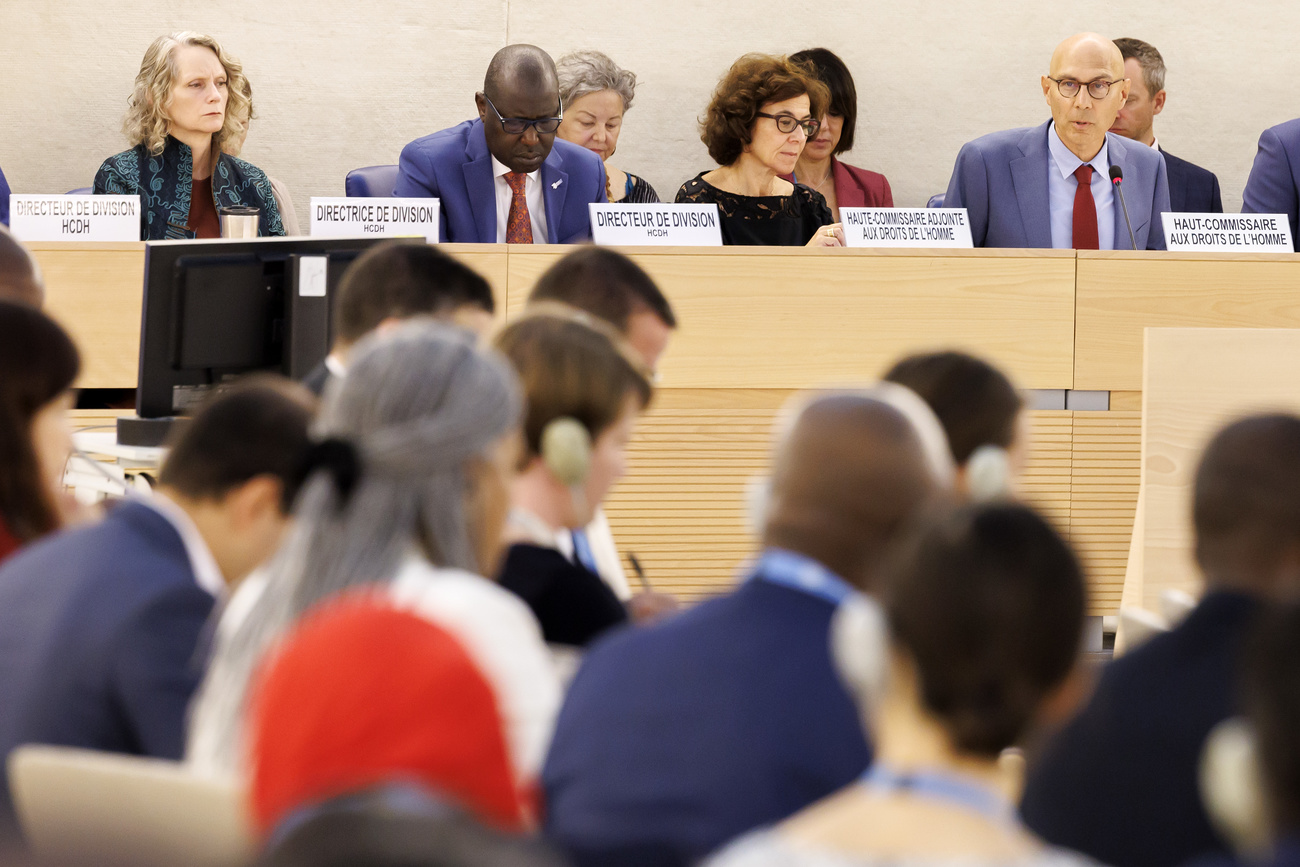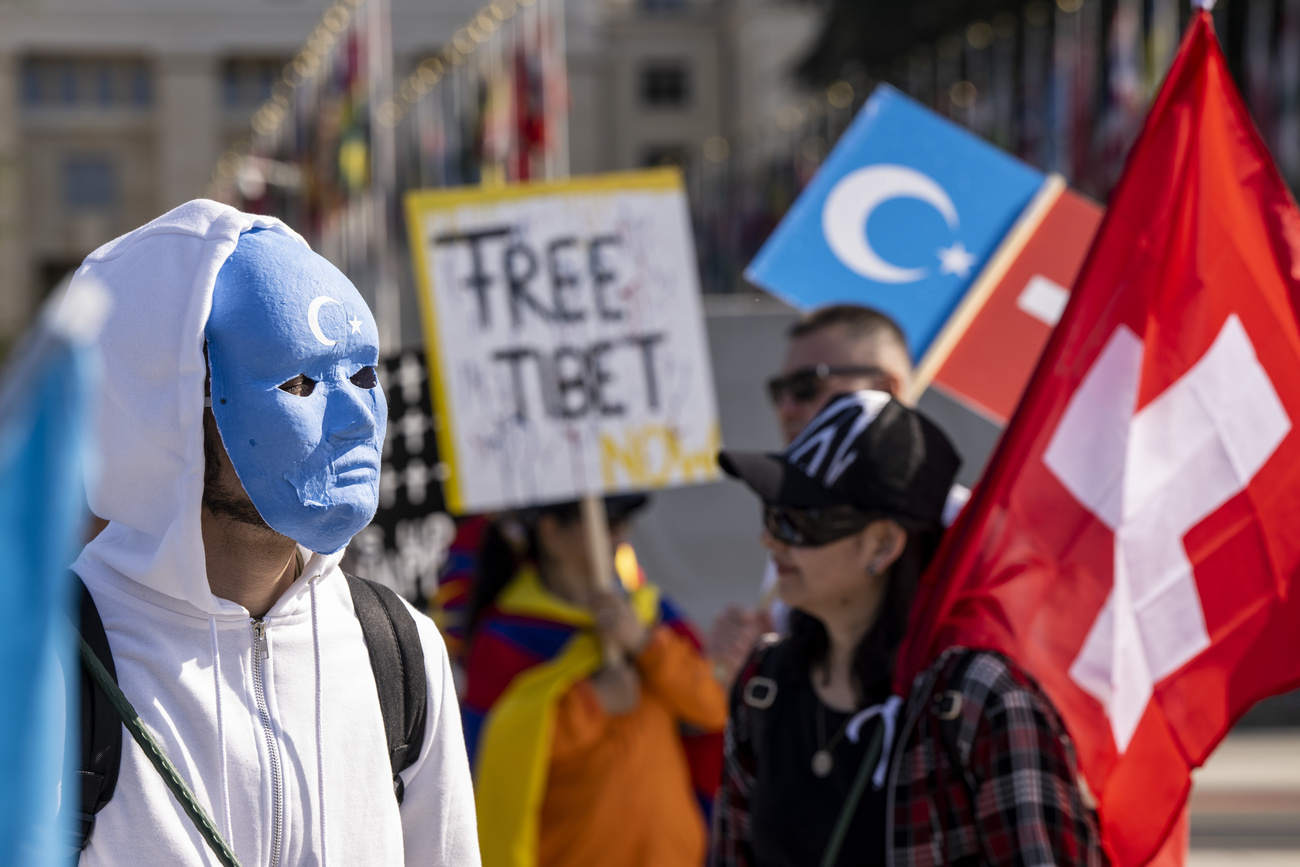‘Human rights are deeply political’

Western powers risk their credibility when they defend human rights unevenly, argues Swiss researcher Christelle Genoud. As they try to rally the so-called "Global South" countries to counter China’s growing influence at the UN, their double standards are a burden.
Under the influence of Western powers, the Human Rights Council has historically more often condemned human rights violations in the so-called “Global South”, particularly in Africa, than in Western countries. For example, the Geneva-based UN body has never passed a resolution denouncing abuses committed by the United States and the United Kingdom in Afghanistan or Iraq.
This unequal treatment, which is commonly called a “double standard”, is increasingly decried. And this perception has been reinforced by the recent wars in Ukraine and Gaza. While the first was widely condemned, Western reactions to the second were much more restrained.
In recent years, the Human Rights Council has been the scene of a heated confrontation between Western democracies and a China determined to put its stamp on the human rights system.
Beijing advocates greater recognition of collective rights, including the right to development, and criticises Western democracies for stubbornly defending individual rights, such as civil rights. Faced with criticism over its treatment of minorities, China retorts that it has lifted millions of people out of poverty.
The High Commissioner for Human Rights, for his part, points out that these rights are universal and that it is wrong to set them against each other. And for their part, countries of the South – key allies during votes – have seen their influence grow, courted as much by Beijing as by Washington, London, and Paris.

More
Human Rights Council vote on China reflects shift in power
In a recent paperExternal link published by the think-tank foraus, Christelle Genoud, a senior lecturer at the University of Lausanne, analyses the response of Western democracies to China’s growing criticism of the human rights system. According to the researcher, their double standards, and their refusal to recognise the political nature of human rights are undermining their credibility.
SWI swissinfo.ch: Is this phenomenon of double standards – criticising the human rights record of some countries while turning a blind eye to one’s own or that of others – a recent development?

Christelle Genoud: No, it’s not new. This issue was already very present, for example, during the Cold War. But the wars in Ukraine and Gaza have reinforced it.
The very strong support shown by Western countries for Ukraine, compared with other crises around the world, was perceived as unequal treatment by Global South countries. Their failure to strongly condemn Israel’s assault on Palestinians in Gaza was also seen as such.
At the same time, Global South countries also have their contradictions, as when Muslim countries support Palestinians in Gaza, but remain silent on the plight of Uighurs in China.
SWI: How is China using these perceptions of double standards?
C.G.: China’s accusations of Western double standards are having an impact because they are part of a general questioning of the UN human rights system. China is exploiting legitimate criticism of this system; criticism that is also levelled by human rights defenders and researchers. The difference is that the latter seek to strengthen these rights, whereas China seeks to weaken them.
Various players are highlighting these flaws. But China has considerable resources and a strong international position, which means that its criticisms take on particular importance.

More
How China is rewriting human rights norms
SWI: You plead for a greater recognition of the political nature of human rights. Why?
C.G.: There is a tendency to defend human rights as moral values that should be above politics. My approach is to recognise that they are profoundly political.
SWI: How are they political?
C.G.: They reflect power struggles. They were accepted in a particular historical context, during the post-war period, and they continue to evolve according to debates. What is considered a human right today is not the same as it was yesterday. New rights have emerged, particularly in relation to the environment.

More
International law adapts as climate court cases add up
SWI: What problem do Western countries have?
C.G.: Western governments tend to believe that the political dimension of human rights must be ignored to guarantee their legitimacy.
But the UN system works in such a way that a state does not need to have a perfect human rights record itself in order to criticise that of other governments. Whether or not this is to be deplored is another matter. And just because a country has an interest in denouncing violations in another state does not make its criticism illegitimate. Nor is it possible to pay equal attention to all crises.
By defending a moral vision of human rights, liberal democracies impose standards that they themselves do not respect, hence their loss of credibility.
SWI: Are Western democracies afraid of losing their influence in a system that they have so far dominated?
C.G.: The question of whether the international human rights system is a Western construct is the subject of much debate. Today, the countries of the Global South are participating in the evolution of this system, which Western countries sometimes see as a danger.
For example, they find it hard to accept the so-called third generation of human rights; collective rights such as the right to development or to a healthy environment. They sometimes tend to cling to a vision of the system as it was in the aftermath of the Second World War.
SWI: Courted by all sides, Global South countries have a lot to gain.
C.G.: The countries of the South are already taking important initiatives. Take Gaza, for example. South Africa has taken Israel to the International Court of Justice, accusing it of genocide in the Gaza Strip, a move supported mainly by countries of the global South and much less by Western democracies.

More
Small island states punch above their weight at UN Human Rights Council
SWI: Human rights are being trampled everywhere. Has the system become paralysed?
C.G.: A change is needed in the way Western countries think about the international human rights system. This should include a willingness to accept new rights, greater transparency about their political agendas and an openness to reform.
The debate tends to focus on the fact that China is challenging the system without recalling that it is widely recognised that it has shown significant weaknesses. Although there is an instrumentalisation by China, certain criticisms are shared by many players who are genuinely seeking to improve the system. That’s why Beijing’s narrative is so well received. China is hitting the right spot, but not for the right reasons. The country is proposing alternatives that weaken human rights instead of strengthening them.
Edited by Virginie Mangin/sj/amva

In compliance with the JTI standards
More: SWI swissinfo.ch certified by the Journalism Trust Initiative










You can find an overview of ongoing debates with our journalists here . Please join us!
If you want to start a conversation about a topic raised in this article or want to report factual errors, email us at english@swissinfo.ch.